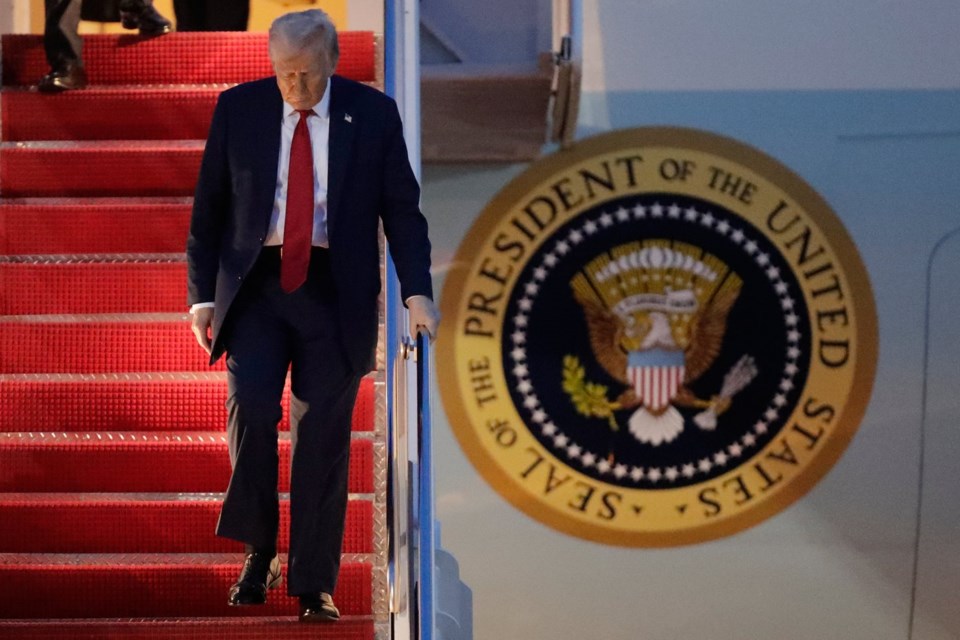OTTAWA — Conservative Leader Pierre Poilievre and the NDP's Jagmeet Singh spelled out their plans to deal with U.S. President Donald Trump's tariff barrage Wednesday, while Liberal Leader Mark Carney shifted to prime ministerial mode to handle the latest wave of levies.
With less than a month to go before Canadians head to the polls, all eyes were on Trump as he prepared to hit several countries — including Canada — with "reciprocal" tariffs in response to various alleged trade practices.
It wasn't clear Wednesday afternoon whether a partial pause on separate, economywide U.S. tariffs on Canada and Mexico — 25 per cent across-the-board tariffs, with a lower 10 per cent levy on energy — would end Wednesday and compound the economic pressure.
Trump said early last month the pause would last until April 2. He was expected to discuss his reciprocal tariff agenda at the White House on Wednesday afternoon.
Carney suspended his election campaign to take part in meetings in Ottawa ahead of the tariff announcement.
He planned to meet virtually Wednesday afternoon with his Canada-U.S. relations council and then, after Trump's speech, convene his cabinet committee on Canada-U.S. relations and national security.
Following their phone conversation late last month, Carney and Trump both indicated they had agreed the two countries would begin to negotiate a new economic and security deal after the election.
At the time, Carney said he would be "working very hard over the next month to earn the right to represent Canada in those discussions."
Before delivering a speech in Toronto, Poilievre was introduced by Caroline Mulroney, a cabinet minister in Ontario's Progressive Conservative government and the daughter of former prime minister Brian Mulroney, who helped usher in the initial free-trade agreement with the United States.
Poilievre said that if he becomes prime minister after the April 28 federal election, he will propose an early renegotiation of the Canada-United States-Mexico Agreement ahead of its planned revision in 2026.
"Why wait? Why not get it done now? Why not end the uncertainty that is paralyzing both sides of the border?" Poilievre asked.
He said Canada would seek a pause on all tariffs during those negotiations.
The trade deal, known as CUSMA, was negotiated during Trump's first term and is up for review next year. Many trade experts have said Trump's tariffs have effectively suspended much of the agreement already.
At a campaign stop Wednesday in Winnipeg, Singh rejected the idea of an early CUSMA renegotiation and suggested Trump must be held to the terms of the existing deal.
"What's the guarantee that he would follow a next agreement if we cave on this one?" Singh asked.
"It's a bad negotiating precedent. How do we trust somebody who negotiated and signed an agreement and then says pre-emptively, without any reason, without any provocation, they're just going to tear it up unilaterally?"
Federal procurement rules should be strengthened to favour the purchase of Canadian products wherever possible to reduce Canada's reliance on the United States, Singh said.
"That's a change that we can make to ensure that when we spend money, it goes towards Canadian businesses, Canadian workers and, most importantly, good unionized workers."
The Liberals are promising to strengthen Canada's agri-food sector and maintain the production quotas that have caused friction in trade talks with the U.S.
Carney said in a media statement Wednesday that supply management is "off the table in any negotiations" with Trump, who has long opposed Canada's system of production quotas for dairy, poultry and eggs.
The Liberals say they have a plan "to protect farmers, ranchers, and agri-food workers" that involves cutting regulations and earmarking $200 million for domestic food processing and $20 million for marketing.
Leger poll results made public Wednesday suggest that as the second week of the campaign began, the Liberals continued to lead in voting intentions with the support of 44 per cent of those surveyed, compared to 38 per cent for the Conservatives.
Data was collected for the online poll from March 26 to 31. Online surveys cannot be assigned a margin of error.
About two-thirds of Canadians polled said their vote choice was final, while around one-third remained open to changing their minds. One-third of Liberal supporters and more than half of NDP voters said they might switch their vote.
— With files from Catherine Morrison, David Baxter, Craig Lord and Dylan Robertson in Ottawa, Sharif Hassan in Toronto, Darryl Greer in Winnipeg and Kelly Geraldine Malone in Washington
This report by The Canadian Press was first published April 2, 2025.
Jim Bronskill, The Canadian Press




